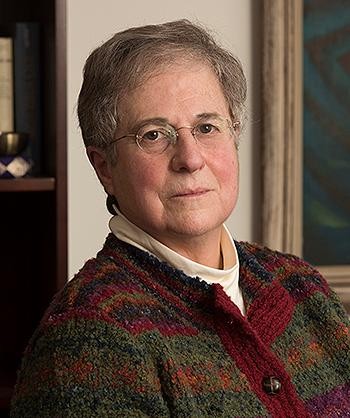Francine J. Cardman, an associate professor of historical theology and church history in the Boston College School of Theology and Ministry, died of cancer on January 21, 2022. She was 74.
Dr. Cardman, who taught at STM and its predecessor, Weston Jesuit School of Theology, for 40 years, was best known for her pioneering contributions to theological education and her scholarship on early church history. Her teaching and writings focused on early Christian ethics and spirituality, ministry and leadership in the early church, and questions of gender and justice in contemporary church practice. Her work was grounded in an historical approach that placed theology and ministry in their social and cultural contexts.

Francine Cardman
In April 2021, the School of Theology and Ministry held “History, Hope, and Justice: A Symposium on the Role of Women in Theological Education” to celebrate the contributions of Dr. Cardman. She and more than 100 current and former colleagues and students gathered virtually for the event which featured presentations by theologians, church historians, and former students, and a prayer service of thanksgiving.
“Francine Cardman was a quiet giant who incrementally, through her teaching, mentorship, publications, and advocacy persistently challenged and moved the church forward to approximate better the more justice-loving and inclusive institution it should be,” said STM Associate Professor of Church History Catherine Mooney, who knew Dr. Cardman for more than 40 years and was one of faculty presenters at the symposium.
Mooney added: “Her acute intelligence and sense of social justice helped to challenge and shape the present and future of the Roman Catholic Church by preparing hundreds of lay women and men, Jesuits, and members of other religious congregations for work as ministers and social justice advocates both in the United States and around the world.”
“Francine Cardman was a consummate scholar, a demanding and engaged teacher, an exemplary colleague, and for nearly 40 years I have been blessed to call her friend,” said Professor Emerita of Theology M. Shawn Copeland, another symposium presenter. “Francine was committed to transforming ecclesial ministry––not merely to make a place for women, but to re-make that very 'place' as one in which all God's human creatures might grow into the full measure of the stature of Christ.”
A respected and influential teacher, Dr. Cardman is remembered by former students for her wisdom, humor, kindness, mentorship, and colorful handouts.
One of them was STM Dean Thomas D. Stegman, S.J. “I can attest that Francine was an outstanding teacher who cared deeply for her students," he said. "As dean, I will always be grateful to her for her role in helping the school draft our self-study in preparation of the accreditation process. We will miss her.”
University of San Diego theologian Emily Reimer-Barry M.T.S. '02 wrote in an online tribute: “She had a gift for helping students appreciate what they didn't know without humiliating us. Her answer would start with kindness, ‘I'm glad you said that, how interesting...’ and then proceed to walk you through a detailed answer about how actually the opposite was true. And somehow, you felt awesome about yourself for asking the question in the first place even though it proved how little you knew.”
In a social media post, bestselling author James Martin, S.J., M.Div. '98, called Dr. Cardman “one of the best teachers I’ve ever had.” He added that she was a “brilliant scholar and wonderful person.”
He noted the significance of Dr. Cardman’s death on the feast day of St. Agnes, one of the virgin martyrs, because Dr. Cardman “wrote brilliantly and provocatively on women in the early church, and specifically the Virgin Martyrs, whom she reframed as women taking control of their own selves in an era of patriarchy.”
He added: “Francine was one of the most beloved of teachers at the old Weston Jesuit School of Theology (which became BC's School of Theology and Ministry): she was at once humble, knowledgeable, demanding, fair, interesting and helpful. Her classes were models of clarity.”
Dr. Cardman published a translation of Augustine’s homilies on the Sermon on the Mount as well as essays on Augustine, women’s ministries and ordination in early Christianity, lay leadership and participation in the early church, structures of governance and accountability in the church past and present, the development of early Christian ethics, and Vatican II and ecumenism. She also edited and contributed to Partners in the Conversation: The Role of Ecumenical Divinity Schools in Catholic Theological Education, a study conducted by the Catholic Task Force at Yale Divinity School, and was a co-investigator and contributor to a pilot study on “A Profile of Spiritual Resilience in Persons Who Live Well with Lifelong Disabilities.” She contributed essays to two STM book projects: Hope: Promise, Possibility & Fulfillment and The Holy Spirit: Setting the World on Fire.
A native of Long Island, NY, Dr. Cardman earned a bachelor of arts degree from Swarthmore College, and a M.Phil. degree and Ph.D. from Yale University.
In 1981, she co-founded the Women’s Theological Center in Boston and was one of the driving forces behind its work, which sought to “assist women in theological seminaries by offering them a corrective to patriarchal interpretations of Christian theology, history, and polity.”
She also participated in Catholic Women Preach, a project that presents videos from a diverse range of Catholic women preaching on the Lectionary readings for Sundays and select feast days.
She served as president of the North American Academy of Ecumenists. She was a board member and former vice president of NETWORK, a Catholic social justice lobby in Washington, D.C., and a longstanding member of the Catholic Theological Society of America. She also served on the Eastern Orthodox/Roman Catholic Consultation in the United States.
She previously taught at Wesley Theological Seminary in Washington, D.C.
Dr. Cardman is survived by her sisters Michele Gilbride and Denise Cardman, and several nieces and nephews. Details on services will be announced later.
Kathleen Sullivan | University Communications | January 2022



